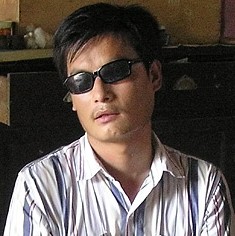Index relies entirely on the support of donors and readers to do its work.
Help us keep amplifying censored voices today.
 Chinese dissident Chen Guangcheng has confirmed allegations that he was booted from his post at New York University, thanks to pressure from Chinese authorities on the university.
Chinese dissident Chen Guangcheng has confirmed allegations that he was booted from his post at New York University, thanks to pressure from Chinese authorities on the university.
“As early as last August and September, the Chinese Communists had already begun to apply great, unrelenting pressure on New York University,” Chen said in a statement released today.
The university is currently planning to launch a campus in Shanghai in the autumn — and according to the New York Post, Chinese officials tied to the project were unhappy with Chen’s presence at NYU. The blind activist and self-taught lawyer joined NYU as a student in its US-Asia Law Institute in May 2012, following a heroic escape from house arrest to Beijing’s US Embassy last year.
Chen also warned that that pressure from China’s ruling party in US academic circles is “far greater than what people imagine”, adding that “academic independence and academic freedom in the United States are being greatly threatened by a totalitarian regime.”
NYU has rejected Chen’s claims, saying that his fellowship was always planned to be a year-long one, and that “its conclusion have had nothing to do with the Chinese government.”
Chen, a vocal critic of China’s one-child policy and forced abortions, was placed under house arrest in 2005 after bringing a class-action lawsuit against the authorities of Linyi, a city in the eastern province of Shandong for its enforcement of the policy. He was eventually given a four year and three month jail sentence on charges of disturbing public order in 2006. He was released in 2010 and placed under house arrest once more, before his escape last year.
Sara Yasin is an Editorial Assistant at Index. She tweets from @missyasin.
The brother of blind Chinese activist Chen Guangcheng has fled his family’s captors in a second escape from their Shandong village. Chen Guangfu arrived in Beijing on Thursday morning after escaping the home where his relatives have been living under strict control since his brother escaped house arrest and fled to the US embassy in Beijing in April. Chen Guangfu is said to be seeking help for his son, Chen Kegui, who was arrested on attempted murder charges earlier this month following a clash with intruders who broke into his home to search for his uncle.
UPDATE: Chen Guangcheng’s relatives have described beatings by local authorities since the activist fled house arrest last month. His brother, Chen Guangfu, father of Chen Kegui was reportedly detained for three days, during which time he was beaten and interrogated.
Chen Guangfu described his ordeal to Hong Kong-based magazine iSunAffairs.com, telling them he was hooded and taken away from his home shortly after Chen Guangcheng escaped. He said: “They put me on a chair, bound my feet with iron chains and locked my hands with handcuffs behind my back,” he said. “They pulled my hands upwards forcefully. Then they slapped me in the face.”
Chen Guangcheng condemned the “pattern of abuse” against his relatives.
The nephew of blind Chinese activist and “barefoot lawyer” Chen Guangcheng has been arrested on charges of attempted murder. Chen Kegui faces charges ranging from 10 years in prison to the death sentence, after he brandished a meat cleaver at intruders searching for his uncle, who escaped from his 18 month-long house arrest in his native Shandong province last month.
Speaking to the Independent, Chen Guangcheng said his nephew had injured, but not killed, some of the intruders who broke into his house in Linyi, Shandong, to search for the activist.
Chen Kegui’s lawyers have come under pressure to drop the claim that Kegui acted in self-defence. His lawyer, Liu Weiguo, has been forbidden from talking to foreign media about the case. Other Chinese lawyers have branded the charges as “ridiculous”.
Chen Guangcheng, who was housed at the US embassy in Beijing following his escape, has said he fears his family would be subject to reprisals if they returned to Shandong. The blind self-taught legal activist, who is currently in a Beijing hospital awaiting permission to travel to the USA, criticised the “mad retribution” his family were experiencing.
Guancheng has told the Guardian that his brother was not allowed to leave his village, and his sister-in-law has been released on bail. His older brother’s family have had all of their phones confiscated, including mobiles.
Chen, noted for his efforts to expose forced abortions and sterilisations, spent four years in prison on charges of disturbing public order before being placed under house arrest in September 2010. Those attempting to visit him have faced harassment and beatings from officials.
Chen Guangcheng won the Index on Censorship whistleblowing award for his activities in 2007
The twists and turns in the fate of “barefoot lawyer” Chen Guangcheng have held all in its thrall. Despite the vigilance of web censors, China’s netizens — particularly its social media users — have found inventive new ways of discussing the case.
China’s web nannies have been on high alert ever since Chen fled his home in his native Shandong province. To bypass the censors, netizens concocted nicknames for Chen, including “Shawshank” (a reference to the film, The Shawshank Redemption) and “Sunglasses” (denoting Chen’s trademark black sunglasses). But within days, these search terms were also blocked .
Tea Leaf Nation, a blog that “makes sense of China through social meda”, rounded up the memes and graphics that people used to express their support for Chen, including photos of girls on Weibo with “Free CGC” tacked onto their bare legs. The pictures are now likely to be deleted.

Blocking on Sina Weibo (China’s hugely popular version of Twitter) has been systematic in the Chen case. “Chaoyang Hospital” the facility where Chen received treatment, is now an illegal term. When you search for it, Weibo tells you that “according to the relevant regulations, search results cannot be shown.”
The authorities are also using soft blocking – Beijing-based film-maker and writer Charles Custer explored how Weibo hides content from users. For Tech in Asia Custer wrote:
What we found is that while Sina did not block “left of his own volition” as a search term … the company clearly took steps to smother discussion of the term by disabling the indexing of new posts containing the term. … While you can still search for posts with “left of his own volition,” you will only see results from before 16:50 this afternoon, which is approximately when Sina blocked the indexing.
Hong Kong University’s China Media Project, has been, as always, the most reliable source of information on what’s been censored. A post by Xiong Peiyun, a journalist and fellow of the centre, is on the Weibo ban list. Links to Xiong’s piece which criticised China for asking for an apology from the US for sheltering Chen in its embassy have been deleted.
Although overtaken by Chen case, China’s crackdown on “rumour-mongering” in the sensitive Bo Xilai affair continues. On 24 April it was reported that the Chinese government shut down at least four Sina Weibo accounts — “Li Delin,” “Guangzhou Wu Guanchong,” “Yangguang de yuanshi” and “Longyitian—945″ — and several reports claim people running these Weibo handles have disappeared.
The Financial Times report that Wu Guanchong was an entrepreneur and avid internet user based in Guangzhou who allegedly used Weibo to circulate rumors about a coup in Beijing. He has been missing for about a month, it is being claimed he was taken away at the end of March by officials from the capital.
Meanwhile, when one searches on Weibo in Chinese for Li Delin, a financial journalist who also blogged extensively on the case, the following notice appears:
Recently, some lawless individuals have used Sina microblog to make up and spread rumors for no reason, which has had a bad effect. They are now being dealt with by Public Security according to the law.
There were a few comments on Weibo about these notices. A student called Zhang Shaoyan wrote:
This [notice] made me think of how our textbooks had described the Kuomintang [Chinese Nationalist Party]. It’s been eighty years, but now the mountains are on our own heads.
Zhang’s comparison of the tactics of the ruling party with the Kuomintang (defeated by the Communist Party during the Chinese civil war) is hardly original. There was a reason he felt so strongly: one of his microblogs had just been deleted.